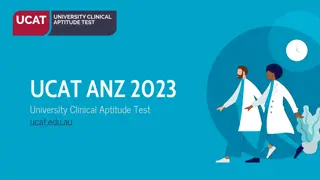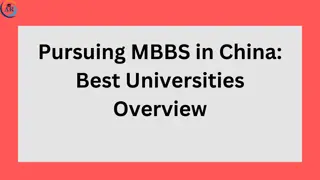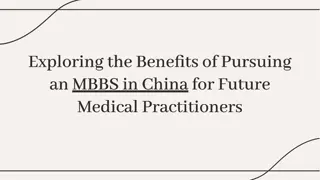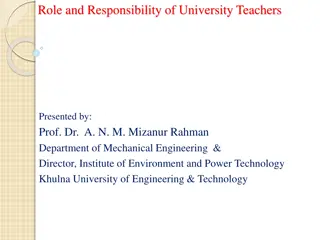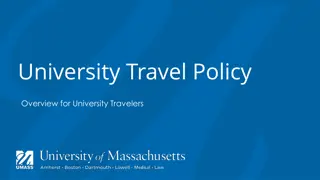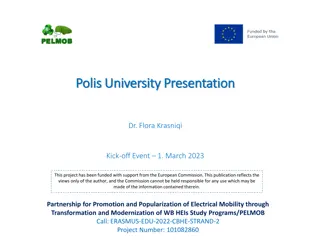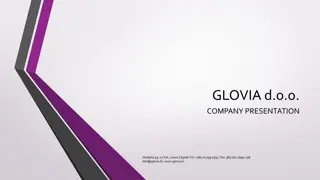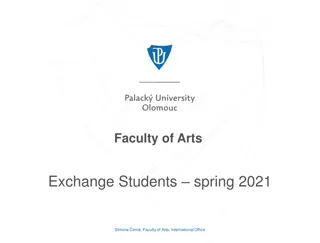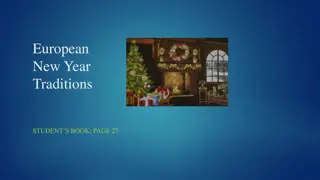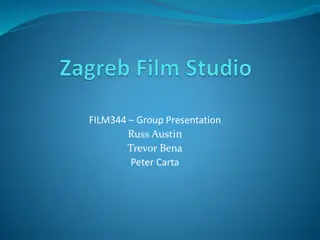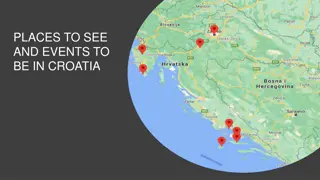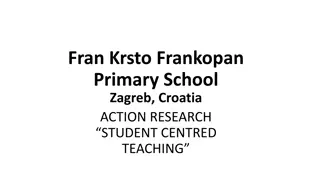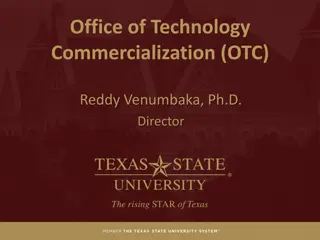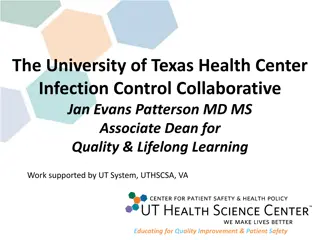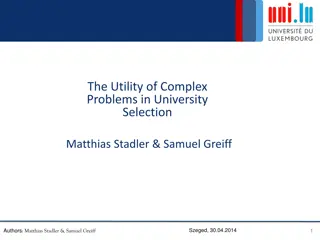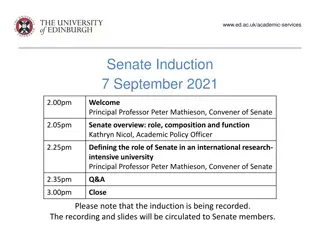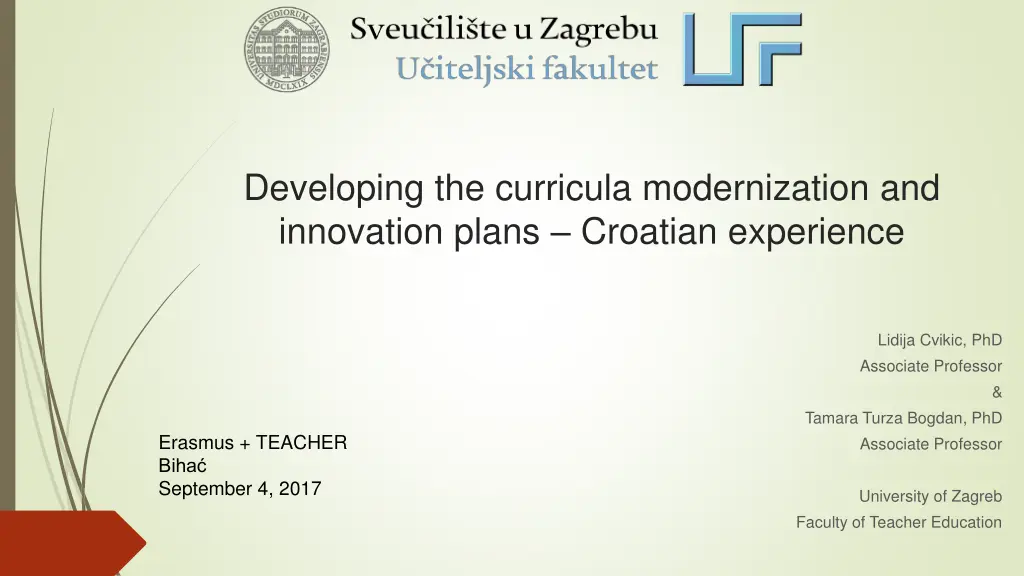
Curricula Modernization in Croatian Teacher Education System
Explore the Croatian experience in developing curricula modernization and innovation plans for teacher education. Learn about the framework for curriculum improvement, Croatian Qualification Framework, and the Croatian Qualification Framework Register. Discover the two-level education system for preschool teachers in Croatia and the implications of project results.
Download Presentation

Please find below an Image/Link to download the presentation.
The content on the website is provided AS IS for your information and personal use only. It may not be sold, licensed, or shared on other websites without obtaining consent from the author. If you encounter any issues during the download, it is possible that the publisher has removed the file from their server.
You are allowed to download the files provided on this website for personal or commercial use, subject to the condition that they are used lawfully. All files are the property of their respective owners.
The content on the website is provided AS IS for your information and personal use only. It may not be sold, licensed, or shared on other websites without obtaining consent from the author.
E N D
Presentation Transcript
Developing the curricula modernization and innovation plans Croatian experience Lidija Cvikic, PhD Associate Professor & Tamara Turza Bogdan, PhD Associate Professor Erasmus + TEACHER Biha September 4, 2017 University of Zagreb Faculty of Teacher Education
Outline Framework for the project of curriculum improvement Project Aims Activities Standard for profession Standard for qualification Implication of project results What can be learned from Croatian example?
Framework for curricula modernization two level education of preschool teachers in Croatia Undergraduate university study Early Childhood and Preschool Education (B.A. level - 180 ECTS) Graduate university study Early Childhood and Preschool Education (M.A. level - 120 ECTS) at UFZG both study programs are performed as full time study since 2015, but were developed long before that in accordance with Bologna reform In 2013 Law of the Croatian Qualification Framework (CROQF)
Croatian Qualification Framework (CROQF) Unified system that enables learning outcomes to be compared with each other Clear relation and comparability with European Qualification Framework Key instrument that is governing the system of qualifications Criteria for sets of competences acquired upon completion of education for qualification at certain level Better matching of learning outcomes with labor market needs Foundation for overview of current qualification and possibility to develop new qualifications Introduces the notion of a set of learning outcomes (skup ishoda u enja) minimum complete set of related learning outcomes at the same level, volume and profile
Croatian Qualification Framework Register Ordinance of the Croatian Qualification Framework Register (2014) defines the content of the Register and procedures for registration of Occupational standards (standard zanimanja) Qualification standards (standard kvalifikacije) Unit of learning outcomes (skupovi ishoda u enja) Occupational standards the list of all works/activities that an individual performs and required competences for their performance; defined by employers Qualification standards content and structure of specific qualification; includes all information relevant for defining a level, volume and profile of qualification Qualification standards should comply with occupational standards
CROQF and education Educational institutions should have clear requirements of the competences that students need to acquire for specific qualification Study programs should have clear and measurable learning outcomes that are validated by relevant qualification registered in CROQF CROQF is basis for development of quality assurance system which ensures that the learning outcomes are acquired at the end of the educational process Only those educational programs that complies with standards from CROQF Register (will) have the right to use CROQF marks and levels (and directly connect to EQF) Note: CROQF Register is not (fully) functioning yet
Project Qualification Standards and Improvement of the Quality of Study Programs for Preschool and Primary School Teachers Faculty of Teacher Education University of Rijeka & Faculty of Teacher Education University of Zagreb 2015 2016 Funded by European Social Fund - main EU financial instrument for achieving strategic objectives of the employment policy http://hkoprojektufri.uniri.hr/hr/ Project publication with all results available at http://hkoprojektufri.uniri.hr/files/prirucnici/Standardi%20kvalifikacija%20ENG.pdf
Reasons for the project The study programs for preschool teacher education in general were made without specific consultation with other stakeholders (employers, national authorities, etc ) Lack of uniformity between programs conducted at different universities Possibility to use CROQF as a tool for harmonization of study programs Main goal: to develop a proposal of a standard of complete qualifications for B.A. and M.A. in preschool education and M.A. in primary education
Project aims To develop a proposal of a standard of qualifications for B.A. and M.A. in preschool education and M.A. To use the standard of qualification to modernize the study programs To propose occupational standards for preschool teachers (B.A.) and expert preschool associates (M.A.)
Project activities Two work groups - for primary education (US) and preschool education (RPOO) Types of project activities: Needs analysis Document analysis Focus groups Education for project target groups Workshops, exchange of experience Study visits (Italy and Sweden) Project meetings
Document analysis and focus groups Conducted to define needs for curriculum improvement Key issues: Insufficient connection of learning outcomes with work requirements in future profession Lack of quality student training to enable strengthening of skills and application of theoretical knowledge Besides preschools and primary schools, other sectors of employment are not recognized
Education for project participants Ivan Zori : Croatian Qualification Framework Career development workshop for students Vlatka Domovi & Vlasta Vizek Vidovi : Teacher a profession? Jelena Pavi i : Occupation preschool teacher and its place at labour market Snje anaPriji Samar ija: New trends in European Higher Education Area do we understand the concept of competences and learning outcomes? Ana Tecilazi Gor i : The role of CROQF in higher education quality assurance Aleksandar u njar: Concepts of competences and learning outcomes in study programs students perspective Vesna Kova : Registration of learning outcomes in full qualification of M.A. in primary education Boris Joki : Integral curriculum reform Vlasta Vizek Vidovi : Research on knowledge and competences Jasna Vukoni uni : Evaluation and self-evaluation in a context of school practice Dejan Ljubobratovi : Using IT for video reflection in students practical work Pero Lu in / Sandra Ku inaSofti : New media in education
Project results 1. Standard for the profession of preschool teachers 2. Standard for the profession of expert preschool associates (stru ni suradnik odgajatelj) 3. Proposal for a standard of a complete Bachelor of early and preschool education qualification level 6 4. Proposal of a standard of a complete Master of early preschool education qualification level 7 5. Proposal of a standard of a complete Master of primary education qualification level 7 6. Proposal for the improvement of the quality of study programs
Occupational standards (standard of profession) Set of norms that determines the content of vocational qualifications at certain level of complexity Necessary knowledge, skills and professional competences that determines activities at this job Competences needed to perform them Results of agreement between stakeholders on labor market and education Defined: type of operation key activities competences needed
Example 1 Type of operation Activities Competences preschool teacher Competences expert preschool associate Participates in team work with professional associates and headmaster during the development of the annual plan and program of kindergarten and preschool curriculum Participates in the development of individualized inclusive programs Planning, organization and analysis of work 1. Participation in preparing annual plan and program of kindergarten and preschool curriculum - Knows the laws and regulations in the field of early and preschool education Carries out an annual program plan based on monitoring and identification of the child s need Applies contemporary models of inclusive education - - - -
Example 1 (in Croatian) Type of operation Aktivnosti Kompetencije odgojitelj Kompetencije stru ni suradnik odgodjitelj Sudjelovati u timskom radu sa stru nim suradnicima i ravnateljem ustanove pri izradi godi njega plana i programa, kurikuluma dje jeg vrti a i pred kole Sudjelovati u izradi individualiziranih inkluzivnih programa Planiranje, organizacija i analiza rada 1. Sudjelovanje u izradi godi njeg plana i programa rada i kurikuluma dje jegvrti a I pred kole - Poznavati zakonsku regulativu u ranom i pred kolskom odgoju i obrazovanju Provesti godi nji plan i program na osnovi pra enja i prepoznavanja potreba djeteta Primijeniti suvremene modele inkluzivnog odgoja i obrazovanja - - - -
Qualification standards Integrated set of learning outcomes of a certain level, volume, profile, type and quality Level of qualification the complexity of acquired qualification described by measurable indicators Volume of qualification the quantity of acquired qualification defined by ECTS or ECVETs Profile of qualification the field of work and study Proved by certificate, diploma or other official document issued by authorized person/institution European Qualification Framework: qualification is a formal result of assessment and evaluation with which the authorities confirm that an individual has achieved certain level of learning outcomes in accordance with established standards Qualification standards presents the basis used in individual educational and study programs Learning outcomes are are grouped in sets (one set contains 5 -10 outcomes)
Sets of learning outcomes (LO) Bachelor of Early and Preschool Education level 6 Master of Early and Preschool Education level 7 Set of learning outcomes Numbers of outcome Set of learning outcomes Numbers of outcome Playing, learning and child development Learning environment 8 Playing, learning and child development Curriculum design and Learning environment Cooperation with family and community Professional development 7 7 9 Curriculum design 9 7 Reflection and self reflection Cooperation with family and community Professional development 6 9 7 Research in education 9 9 Kindergarten organization Education policy 9 6
Skup ishoda uenja Bachelor of Early and Preschool Education level 6 Master of Early and Preschool Education level 7 Skup ishoda u enja Broj ishoda Skup ishoda u enja Broj ishoda Igra, u enje i razvoj djeteta Okru enje za u enje 8 Igra, u enje i razvoj djeteta 7 7 Oblikovanje kurikuluma I okru enja za u enje Suradnja s obitelji i zajednicom Profesionalni razvoj Istra ivanja u odgoju i obrazovanju Organizacija dje jegvrti a Obrazovne politike 9 Oblikovanje kurikuluma 9 7 Refleksija i samorefleksija Suradnja s obitelji i zajednicom Profesionalni razvoj 6 7 9 9 9 9 6
Example 2 Set of learning outcomes Learning outcomes level 6 Learning outcomes level 7 1. Select necessary and apply modern theories of child development and learning 2. Recognize a child s skills, abilities, and interests used to encourage his/her learning and development 1. Critically judge contemporary theories of child development and learning 2. Project the course of the education process in response to the child s need PLAY, LEARNING, AND CHILD DEVELOPMENT 3. Argue assessment of the child s activities and opportunities after observing and documenting 3. Support the learning process of a child on the basis of monitoring and recognition of his/her overall development 4. Organise and implement exible time- rhythm of life of children in the kindergarten 4. Interpret modern childhood at the interdisciplinary level 5. Recognize and analyse the child s preparation for school 5. Adjust the ow of activities in (un)planned circumstances and situations 6. Plan and apply modern strategies for promoting play, learning and development of children with special needs and rights 6. Explain the types and role of play, and apply it in the process of a child s development and learning 7. Generate and integrate an understanding of well-being for successful individual functioning and positive social relationships in a quality environment 7. Recognise the peculiarities in play, learning, and development of children with special needs and rights, and act in accordance with them 8. Describe and interpret the personal, emotional, physical, and social well-being
Example 2 (in Croatian) Skup ishoda u enja Ishodi u enja razina 6 (B. A.) Ishodi u enja razina 7 (M. A.) kritic ki prosu ivati suvremene teorije djec jega razvoja i uc enja odabrati i primijeniti suvremene teorije djec jega razvoja i uc enja prepoznati djetetovesposobnosti, mo- guc nosti i interese u funkciji poticanja njegova uc enja i razvoja projicirati tijek odgojno-obrazovnoga procesa kao odgovor na djetetove po- trebe Igra, u enje i razvoj djeteta poduprijeti proces uc enja djeteta na te- melju prac enja i prepoznavanja njegova cjelokupnoga razvoja argumentirati procjenu djetetovih ak- tivnosti i moguc nosti nakon promatranja i dokumentiranja organizirati i provoditi eksibilan ritam z ivota djece u djec jem vrtic u protumac iti suvremeno djetinjstvo na interdisciplinarnoj razini prilagoditi tijek aktivnosti u (ne)planira- nim okolnostima i situacijama prepoznati i analizirati pripremljenost djeteta za s kolu objasniti vrste i ulogu igre te je primijeniti u procesu razvoja i uc enja djeteta planirati i primijeniti suvremene stra- tegije poticanja igre, uc enja i razvoja djece s posebnim potrebama i pravima prepoznati posebnosti igre, uc enja i razvoja djece s posebnim potrebama i pravima te djelovati u skladu s njima generirati i integrirati razumijevanja dobrobiti za uspjes no individualno funkcioniranje i pozitivne drus tvene odnose u kvalitetnom okruz enju opisati i protumac iti osobnu, emocionalnu, tjelesnu i socijalnu dobrobit
Implications of project results Primary goal of the project was to improve the study programs by using CROQF Starting point for the procedure of standardization of study programs based on the qualification standards Reconstruction and revision of study programs Starting points for study program improvement: Compliance, interdisciplinarity and internal consistency of study programe (e.g. common core competences) Integration of study courses at the level of learning outcomes (e.g. one larger seminar paper that will integrate LO of more courses) One-semester study courses with the exceptions (more ECTS) Continuity in study program construction (pre-requisites for courses) All study courses end with exams / formal evaluation Revision of mandatory and elective courses More elective courses Improve programs in the section of LO that emphasize practical skills Last semester of study should be focused on the final/diploma paper
Proposal for the improvement of early and preschool education study programs conducted at UFZG Learning outcomes from the defined set of the LO compared to LO of existing courses In order to achieve all proposed learning outcomes: some courses should be revised new courses should be introduced Proposal for the ratio of particular groups of courses in the program
Proposed group of courses % 25-40 Courses belonging to fundamental scientific disciplines Substrat sciences and integrated methodical courses Courses for the development of research competences Courses for the development of practical competences 10-25 Compulsory courses 70% 10-25 20-35 Courses belonging to fundamental scientific disciplines Substrat sciences and integrated methodical courses Courses for the development of research competences 0-15 Elective courses 0-15 30% 0-15
Example 3 Set of learning outcomes Learning outcomes level 6 Courses 1. Select necessary and apply modern theories of child development and learning 2. Recognize a child s skills, abilities, and interests used to encourage his/her learning and development Pedagogy of Early and Preschool Education Developmental Psychology Inclusive Pedagogy PLAY, LEARNING, AND CHILD DEVELOPMENT Socio-emotional development and children rights 3. Support the learning process of a child on the basis of monitoring and recognition of his/her overall development 4. Organise and implement exible time- rhythm of life of children in the kindergarten Applied Developmental Psychology 5. Adjust the ow of activities in (un)planned circumstances and situations 6. Explain the types and role of play, and apply it in the process of a child s development and learning 7. Recognise the peculiarities in play, learning, and development of children with special needs and rights, and act in accordance with them 8. Describe and interpret the personal, emotional, physical, and social well-being
Example 3 Set of learning outcomes Learning outcomes level 7 Courses 1. Critically judge contemporary theories of child development and learning Psychology of Parenthood Contemporary literary theories in children literature 2. Project the course of the education process in response to the child s need Kinesiological transformation PLAY, LEARNING, AND CHILD DEVELOPMENT 3. Argue assessment of the child s activities and opportunities after observing and documenting Contemporary childhood Theories of language development in children 4. Interpret modern childhood at the interdisciplinary level Traditional and new media at an early age 5. Recognize and analyse the child s preparation for school Inclusive curriculum 6. Plan and apply modern strategies for promoting play, learning and development of children with special needs and rights A child in crisis 7. Generate and integrate an understanding of well-being for successful individual functioning and positive social relationships in a quality environment
Example 3 (in Croatian) Skup ishoda u enja Ishodi u enja razina 6 (B. A.) Kolegiji Pedagogija ranoga odgoja odabrati i primijeniti suvremene teorije djec jega razvoja i uc enja prepoznati djetetove sposobnosti, mo- guc nosti i interese u funkciji poticanja njegova uc enja i razvoja Razvojna psihologija Inkluzivna pedagogija PLAY, LEARNING, AND CHILD DEVELOPMENT poduprijeti proces uc enja djeteta na te- melju prac enja i prepoznavanja njegova cjelokupnoga razvoja Socioemocionalni razvoj i djec ja prava organizirati i provoditi eksibilan ritam z ivota djece u djec jem vrtic u Primijenjena razvojna psihologija prilagoditi tijek aktivnosti u (ne)planira- nim okolnostima i situacijama objasniti vrste i ulogu igre te je primijeniti u procesu razvoja i uc enja djeteta prepoznati posebnosti igre, uc enja i razvoja djece s posebnim potrebama i pravima te djelovati u skladu s njima opisati i protumac iti osobnu, emocionalnu, tjelesnu i socijalnu dobrobit
Example 3 (in Croatian) Set of learning outcomes Learning outcomes level 7 Courses Psihologija roditeljstva kritic ki prosu ivati suvremene teorije djec jega razvoja i uc enja Suvremene knjiz evne teorije u djec joj knjiz evnosti projicirati tijek odgojno-obrazovnoga procesa kao odgovor na djetetove po- trebe PLAY, LEARNING, AND CHILD DEVELOPMENT argumentirati procjenu djetetovih ak- tivnosti i moguc nosti nakon promatranja i dokumentiranja Kineziolos ke transformacije protumac iti suvremeno djetinjstvo na interdisciplinarnoj razini Suvremeno djetinjstvo prepoznati i analizirati pripremljenost djeteta za s kolu Teorije djec jega jezic nog razvoja planirati i primijeniti suvremene stra- tegije poticanja igre, uc enja i razvoja djece s posebnim potrebama i pravima Klasic ni i novi mediji u ranoj dobi generirati i integrirati razumijevanja dobrobiti za uspjes no individualno funkcioniranje i pozitivne drus tvene odnose u kvalitetnom okruz enju Inkluzivni kurikulum Dijete u krizi
What can be learned from Croatian example? In designing new programs it is necessary to include all stakeholders, especially graduates and employers Importance of appropriate, simple and clear methodology Common standards / unified programs should be flexible and adaptive (to match needs and characters of different HEIs) Curriculum modernization should anticipate future changes in the educational system programs should fit needs of students, educational system and society in 8 - 10 years
Qualification standards content and structure of specific qualification includes all information relevant for defining a level, volume and profile of qualification Level of qualification the complexity of acquired qualification described by measurable indicators Volume of qualification the quantity of acquired qualification defined by ECTS or ECVETs Profile of qualification the field of work and study
Standard zanimanja (engl. Occupational Standards) je popis svih poslova koje pojedinac obavlja i popis kompetencija potrebnih za njihovo uspje no obavljanje. Standard nekog zanimanja odre uju poduzetnici, poslodavci i predstavnici poslodavaca, a iskazuje se izrazima prikladnim referentnoj razini HKO-a. Standard kvalifikacije (engl. Qualification Standards) ozna ava sadr aj i strukturu odre ene kvalifikacije, a uklju uje sve podatke koji su potrebni za odre ivanje razine, obujma i profila kvalifikacije, kao i podatke koji su potrebni za osiguravanje I unaprje enje kvalitete standarda kvalifikacije.

